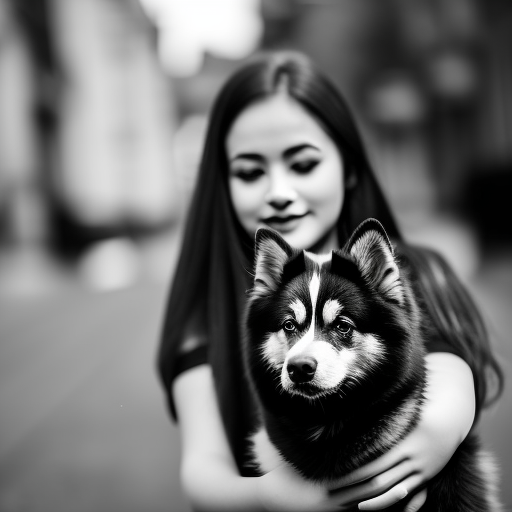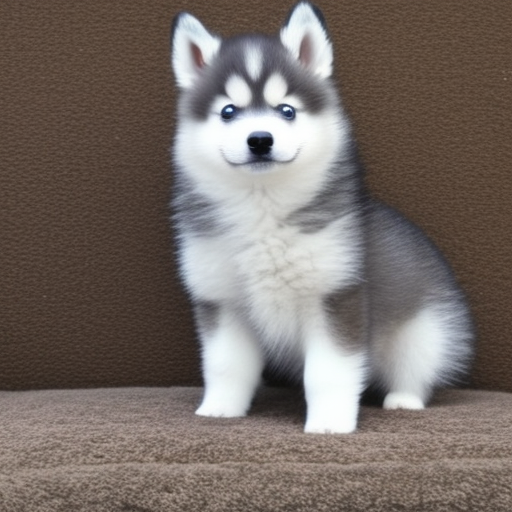Are you feeling overwhelmed with training your new Pomsky puppy? Don’t worry, you’re not alone. Training a furry little buddy can be challenging, but it’s important to start obedience and behavior training as early as possible to ensure a positive bond and a well behaved pup. Below are some tips and techniques to help with socialization, housebreaking, leash training, and more.
Socialization: Start Early
Pomskies are known for their friendly and outgoing personalities, but you still need to socialize them from a young age to ensure proper behavior. Allow your puppy to interact with other dogs, people, and environments. This will give them confidence and teach them how to behave in different situations.
Housebreaking: Be Consistent
The key to successful housebreaking is consistency. Establish a routine for feeding, walks, and playtime, and stick to it. Use positive reinforcement by rewarding your pup with a treat or praise every time they go potty outside. When accidents happen inside, use a firm correction and immediately take them outside to finish their business.
Crate Training: Make it Positive
Crate training can help with housebreaking and prevent destructive chewing behavior. Make it a positive experience by gradually introducing your puppy to the crate with treats and toys. Never use the crate for punishment and always make sure it’s the appropriate size for your pup.
Leash Training: Rewards and Positive Reinforcement
Start leash training early to prevent pulling and allow for enjoyable walks. Use rewards and positive reinforcement, such as treats or praise, to encourage good behavior. Practice in safe and quiet environments before moving to busier areas.
Chew Toys: Prevent Destructive Behavior
Pomskies are known for their love of chewing, so provide them with plenty of chew toys to prevent destructive behavior. Rotate toys frequently to keep them engaged and always supervise playtime.
Exercise: Consistency is Key
Pomskies are an active breed that requires regular exercise, such as walks or playtime, to prevent boredom and destructive behavior. Establish a consistent exercise routine to ensure a happy and healthy puppy.
Training Sessions: Short and Sweet
Training sessions should be short and sweet, preferably no longer than 15 minutes. Use a clicker or verbal cues to signal commands such as “sit” or “stay”. Always use positive reinforcement and avoid physical corrections that can damage the bond between you and your pup.
Training Treats: Use in Moderation
Training treats can be effective tools for obedience training, but they should be used in moderation. Low calorie options, such as dry kibble or small pieces of cheese, can be used as rewards without overindulging.
Patience and Bonding: Success Takes Time
Training a puppy takes time and patience. Establish a bond with your Pomsky by spending quality time together and communicating effectively. Take time to listen to your pup and understand their needs.
Corrections and Aggression: Seek Professional Help
If your Pomsky displays aggressive behavior, seek professional help from a veterinarian or a trainer. Physical corrections, such as hitting or yelling, should never be used as they can harm the relationship between you and your pup.
In conclusion, training a Pomsky puppy takes patience, consistency, and positive reinforcement. Use the techniques and tips outlined above to ensure a happy and well behaved pup. Remember, it’s never too early to start training and building a strong bond with your furry little buddy.
10 Top Key Takeaways:
- Start socialization and training as early as possible
- Consistency is key to successful housebreaking
- Make crate training a positive experience
- Use rewards and positive reinforcement for leash training
- Provide plenty of chew toys to prevent destructive behavior
- Establish a consistent exercise routine for a happy and healthy puppy
- Short training sessions work best
- Training treats should be used in moderation
- Build a bond with your Pomsky through quality time and communication
- Seek professional help for aggressive behavior.
Start building a positive relationship with your Pomsky today by implementing the above techniques and tips. Remember, a well behaved pup is a happy pup.

Hey there, I’m Holly – the proud owner of the Pomsky Dog Puppies website! As a lifelong dog lover and enthusiast, I’ve always been fascinated by these furry little creatures. And when I discovered the unique breed of Pomskies, I just knew that I had to share my passion with the world! When I’m not busy writing or taking care of my own pack of dogs, you’ll often find me exploring the great outdoors or spending time with my family. So if you’re ready to join me on this exciting journey through the wonderful world of Pomskies, then let’s get started!

